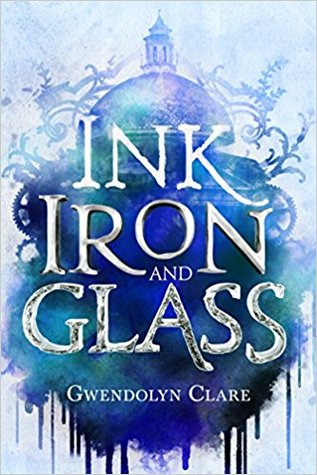Description: A certain pen, a certain book, and a certain person can craft entirely new worlds through a branch of science called scriptology. Elsa comes from one such world that was written into creation, where her mother―a noted scriptologist―constantly alters and expands their reality. But when her home is attacked and her mother kidnapped, Elsa is forced to cross into the real world and use her own scriptology gifts to find her. In an alternative Victorian Italy, Elsa finds a secret society of young scientists with a gift for mechanics, alchemy, or scriptology―and meets Leo, a gorgeous mechanist with a smart mouth and tragic past. She recruits the help of these fellow geniuses just as an assassin arrives on their doorstep.
Review: Gwendolyn Clare's debut steampunk-fantasy novel, Ink, Iron, and Glass has an intriguing premise. Elsa’s home world of Veldana was written into existence by her mother, Jumi. Jumi is a scriptologist, capable of creating new worlds through words alone. When Jumi is kidnapped, Elsa must put her own scriptology skills to work, traveling to a steampunk, alternative version of Victorian yet to be unified Italy, where she meets a group of pazzerellone, young people with an aptitude for one of three disciplines: mechanics, alchemy, or scriptology. Elsa is strong, brilliant, and fiercely independent young woman. I liked her right away. She does have a cold exterior as she has been taught from a very young age to not trust others, but she slowly opens up and reluctantly befriends Italians Leo and Porzia and Tunisian Faraz when she finally admits that her mission is far too big for a solo adventure. As the four get closer to finding Elsa’s mother and learning the reason for her capture, they discover an enemy who will stop at nothing to use scriptology as a weapon to “edit” the Earth according to their liking.
I have read quite a few steampunk novels, but never has the novel fully embrace the technology and the world building like this book. From the clothes to transportation and to the Casa della Pazzia (translated to House of the Maddness) is essentially a smart house where Casa is very much like Siri, Alexa, or Ok Google. The author does a great job in bringing this engrossing world to life. In addition to the great world building, I also appreciated the deeper topics such as otherness or the troublesome use of the word "exotic" which apply to both Elsa and Faraz as people of color. The ethics of being a scriptologist is also discussed as Elsa's mother strives to give her people freedom where as another scriptologist scribed pregnancies of woman against their will in Veldana. Freedom and duties to country are also addressed by warring factions in Italy. I also found the idea of calling those who are scientifically inclined to be called "mad" not a comment on their mental health but rather the historical context of the ongoing conflict between science and the Church.
The book does have a couple of flaws, but it didn't hinder my reading enjoyment. The first few chapters were a bit slow and disorientating as I tried to make sense of what was happening. Once I got my bearings there was plenty of action to hold my interest. There is a romance that feels very much insta-love and there are quite a few corny lines that made me roll my eyes but I am hoping this will decrease as the series goes on. The book does not really end in a cliffhanger because the "twist" seemed obvious to me but I am definitely planning on continuing this series to see where it goes.
Rating: 4 stars
Words of Caution: There is some language, mention of women being pregnant against their will, and violence. Recommended for Grades 9 and up.
If you like this book try: Infernal Devices by Cassandra Clare, The Eyre Affair by Jasper Fforde, The Book Jumper by Mechthild Gläser













I haven't read any steampunk but this one sounds interesting. I like the idea that someone can write a new world.
I haven't read much steam punk but this one intrigues me.